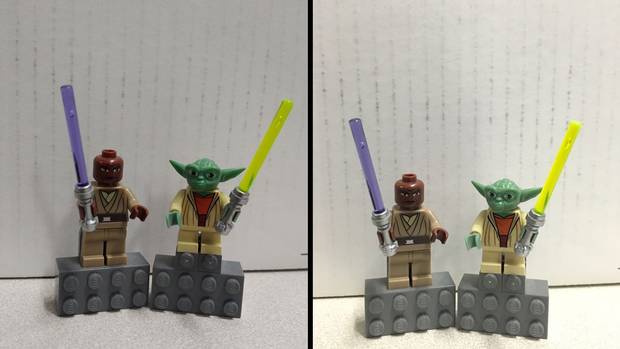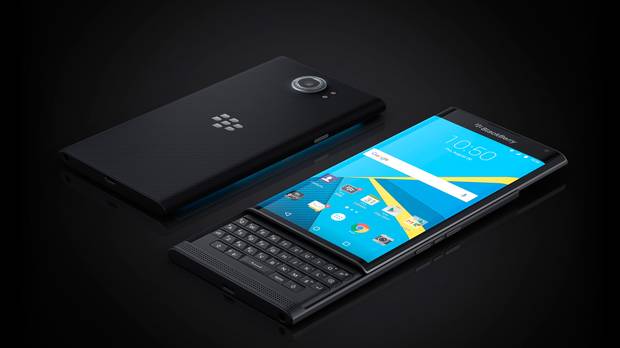I liked just about everything about the new BlackBerry Priv, except for the most important thing about it.
Priv is the fourth new BlackBerry device released under the leadership of CEO John Chen, and I think it's the most polished and modernized smartphone of the lot. BlackBerry's other recent devices, the Passport, Classic and the lower-end Leap, had unusual screen sizes or middling build quality. In contrast, Priv looks like it could have been made by any of the half dozen really successful smartphone manufacturers.
But I won't keep you in suspense: My concern with this phone is its cost; $899 without a contract is a trivial matter for the CEOs who have been waiting for a really good BlackBerry phone, but not trivial to the millions of people BlackBerry needs to buy this thing if it's going to survive as a hardware manufacturer. But more on that later; there really is a lot to like here if price is no object.

handout
The slide-out physical keyboard had me worried. A mechanical part on a modern slab-style touchscreen phone? But even though I've fallen out of the habit of using BlackBerry's QWERTY keyboard, I found it intuitive to use and a little easier than the sometimes cluttered BlackBerry digital keyboard, which has a lot of auto-suggest text. The physical keyboard retains the capacitive frets that let you do some of the swipe and scroll on-screen actions the Passport allowed, and it has a lot of those familiar keyboard shortcuts. It even balances well in the hand so there's really no letdown here for keyboard lovers, and the product designers I spoke with assured me they popped and retracted the keyboard about a million times in testing to make sure the mechanism doesn't fail.
It has a big, gorgeous 5.4-inch screen that curves at the edges, and the whole thing is surprisingly light in the hand and has a really nice long-lasting battery. My version of a torture test is to never plug it in until the screen goes dark while I am testing a phone, and the Priv typically lasts two days of intermittent use and one day of heavy use. The camera, with its 18-megapixel sensor, held up very well in one-to-one comparisons with the iPhone 6S Plus; the colour saturation may have actually been a little better.

On the right, an image shot with BlackBerry’s new Priv. On the left, the same photo from an iPhone 6+.
I haven't talked about the elephant in the room, and loyal BlackBerry fans likely already know this, but this device is also the first handset from the Waterloo, Ont., pioneers of the smartphone that is powered by an operating system they did not make. The Priv uses Google's Android operating system instead of the proprietary BB10 OS, and there's some question about whether this signals the end of BB10. The company has not even confirmed it will make any new phones after the Priv, but has indicated they will unveil their product road map at the Consumer Electronics Show in Las Vegas in 2016. But if the Priv sells well, why would they go back to an OS that has dragged down sales quarter after quarter since its introduction?
Even though BlackBerry says it has secured this version of Android (and I'm not a security penetration tester, so I will leave that claim to the professional hackers to probe in the weeks to come), it is not a "fork" of the OS (like Amazon's Kindle Fire operating system) nor does it add a lot of customized interfaces (that are usually worse than the original) to the system like a lot of other Android handset-makers do. This is full Google: It has the Play Store, Maps, Gmail and other core Google mobile apps installed. It also has the key BB10 apps such as the Hub messaging centre, calendar, BBM, even a new security monitoring app called DTEK.
But what's important here is that Android is the world's dominant mobile operating system, and has most of the major consumer apps that BlackBerry phones have been missing since the iPhone-led app revolution took over mobile computing. There are still some iPhone specific apps in the market, but by and large if you want a hot app, you can easily download and use it on this BlackBerry. At last.
Priv runs the Android 5.1.1 Lollipop, which is almost exactly one year old. Lollipop can be found on most of this year's best-selling Android phones from Samsung, Huawei and Lenovo. But of course the Priv is arriving now when some of the very latest high-end Android devices are also going on sale, like Google's Nexus 6P that runs on the newer Android 6 Marshmallow edition.
Not only is the software a year old, but I was curious as to why an $899 phone released in late 2015 is using a processor first released in early 2014. There is some suggestion that the Priv's Qualcomm Snapdragon 808 Hexa-Core may actually be a little less prone to overheating than the newer more powerful Snapdragon 810. But the aforementioned Nexus 6P runs on the 810, for instance. When I asked BlackBerry why, they sent this through their PR team:
"Chipset selection is of course an elemental decision in defining a new product. To make such a decision, we consider a number of variables with an overall focus on end-user experience. The decision to go with the 808 was primarily centred on how it is optimized for the performance and user experience metrics we focused on for PRIV."

handout
What does that even mean? The highlights listed on BlackBerry's online store don't mention the processor, it does mention the fancy-sounding Schneider-Kreuznach camera lens, the 3410 mAh battery, and the curved screen (which is an plastic AMOLED display with 2560 x 1440 pixels). Another weakness is the piddly 32 gigabytes of on-board storage, although you can expand it with an SD card.
So, what don't I like? This is the newest device from BlackBerry and it's priced like an iPhone (you could get the new iPhone 6S for $899, the 16-GB version). If you're a hardcore Crackberry-type, you'll say "so what?" But the Priv is more expensive than the bigger, faster, newer Nexus 6P made by Huawei for Google. The 32-GB version costs $699, the 128-GB costs $849. Of course, there will be deals on contract for the Priv when Canada's big three carriers and AT&T in the U.S. put it in stores at launch on Nov. 9. But bear in mind that whatever deal you might get, there will be a cheaper phone sitting right next to it. For example, the ZTE Axon, which is a high-end Android phone from another ultra-cheap Chinese manufacturer, will go on sale for zero down on a two-year contract at Rogers on Nov. 6.
Are you willing to pay iPhone prices for a physical keyboard at this stage in the smartphone marketplace? Is it the promise of security that makes it worth all that money? For IT managers it will make sense, especially because BlackBerry has announced it will be able to bypass carriers and directly install security updates to the Priv. That should please chief information officers who are used to Android's legacy of headache-causing delays, but most consumers don't pull out the wallet for that kind of security.
This isn't a critique about how the phone works, but it's important context: According to market research firm IDC, Samsung is the number one Android manufacturer with 23.8 per cent of the total mobile market in the latest quarter. Number two in mobile is Apple, with 13.5 per cent (although we should stress, Apple has among the best profit margins in the industry too). Number three is China's Huawei with 7.5 per cent, which shipped 26.5 million Android phones to take the number three spot. Of those units, only 35 per cent are priced as mid- or high-range devices. Huawei sells mostly really cheap phones, under $100 in some cases (no contract!).
None of these phone makers prioritize security or have physical keyboards.
BlackBerry has said it has to sell five million phones in its fiscal year to break even. In the first quarter of this fiscal year it sold 1.1 million; in the second quarter it sold about 800,000. Its latest phone is one of its most expensive devices ever. The luxury-branded BlackBerry Porsche Design P'9983 would run you about $1,950, so by comparison the Priv is a bargain.
So let's be serious for a minute. Nobody charges this much money for an Android phone, and price is Android's major selling point against the Apple "premium." The fact that BlackBerry is trying to win back share with a mass-market device that costs significantly more than its established rivals strikes me as risky, and perhaps overly optimistic. I'm happy to be proven wrong, because I think BlackBerry's first Android phone is really great, even if there are better and cheaper Android devices competing against it right now. If you can convince your company to buy it for you, you probably won't be disappointed.